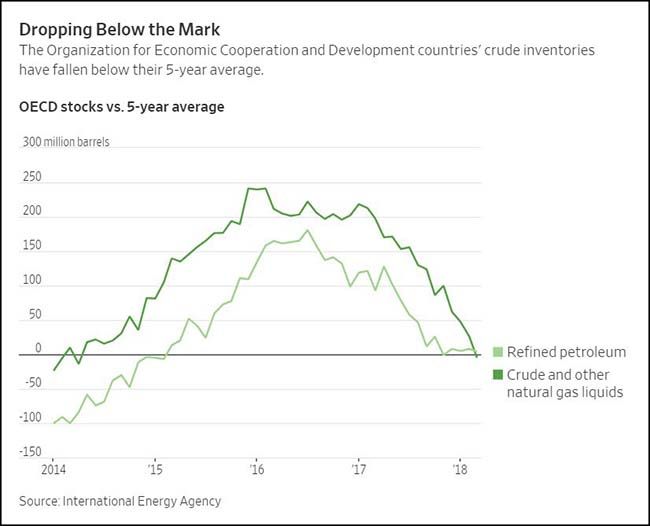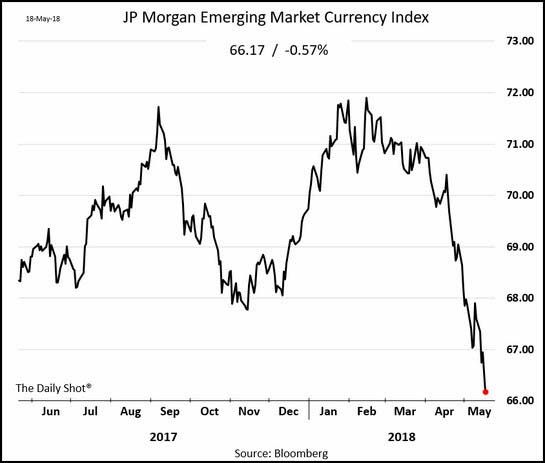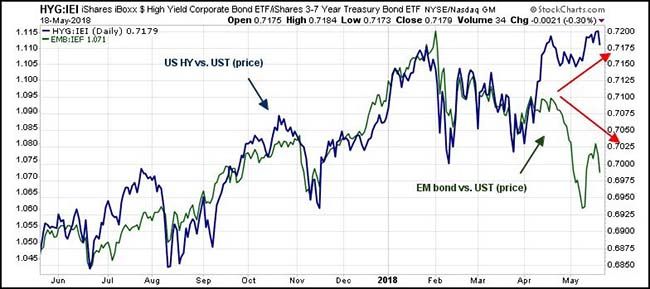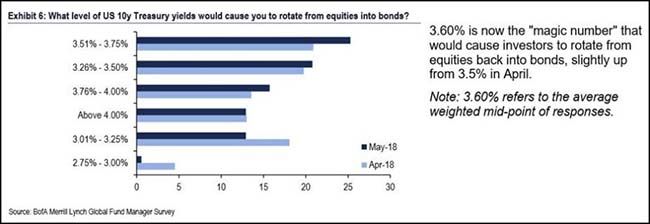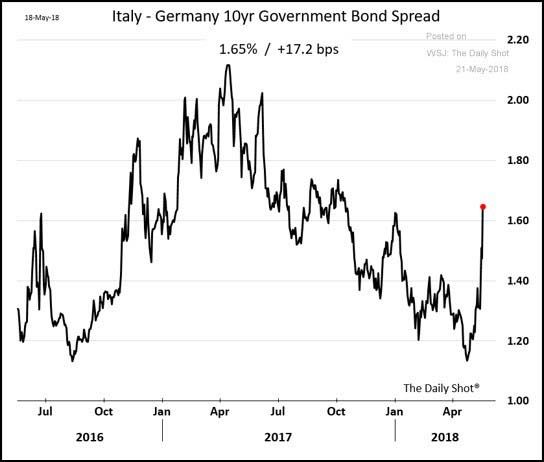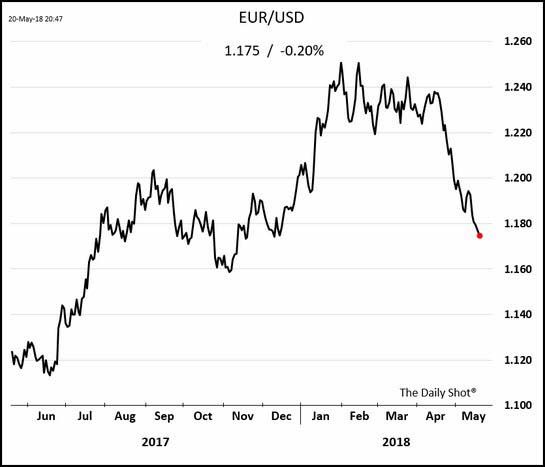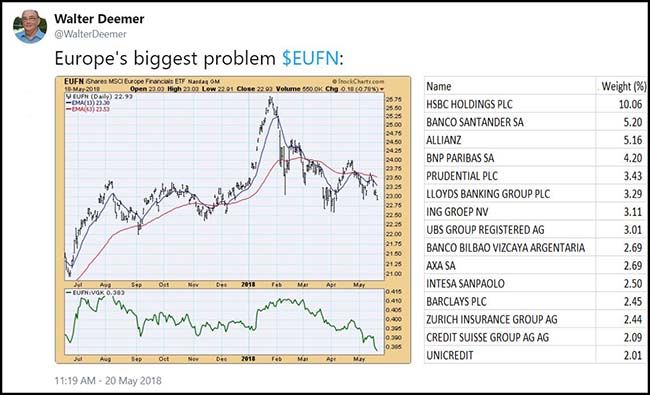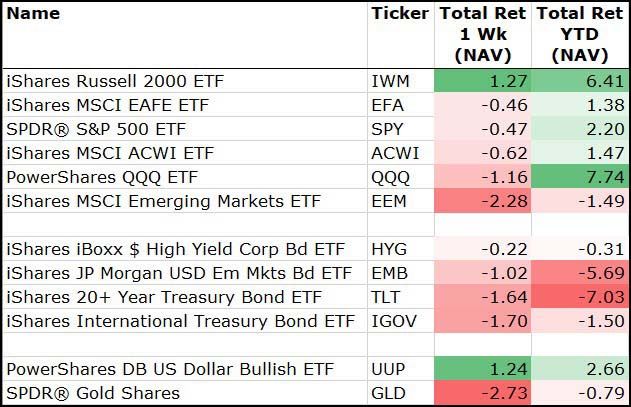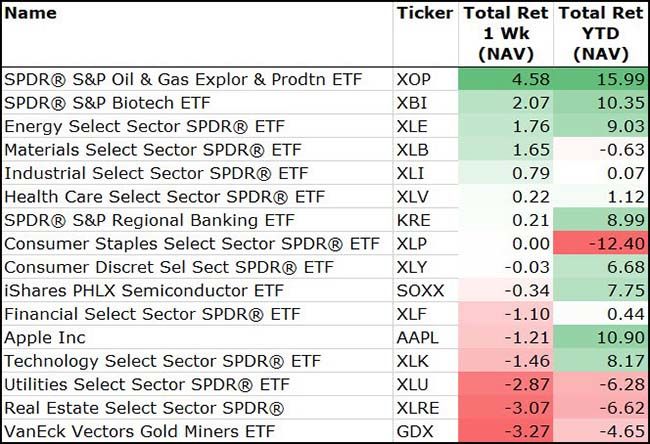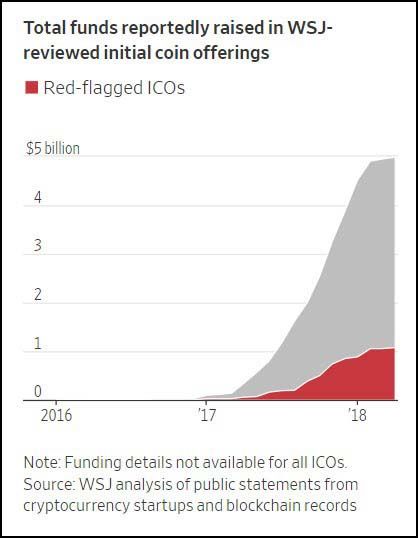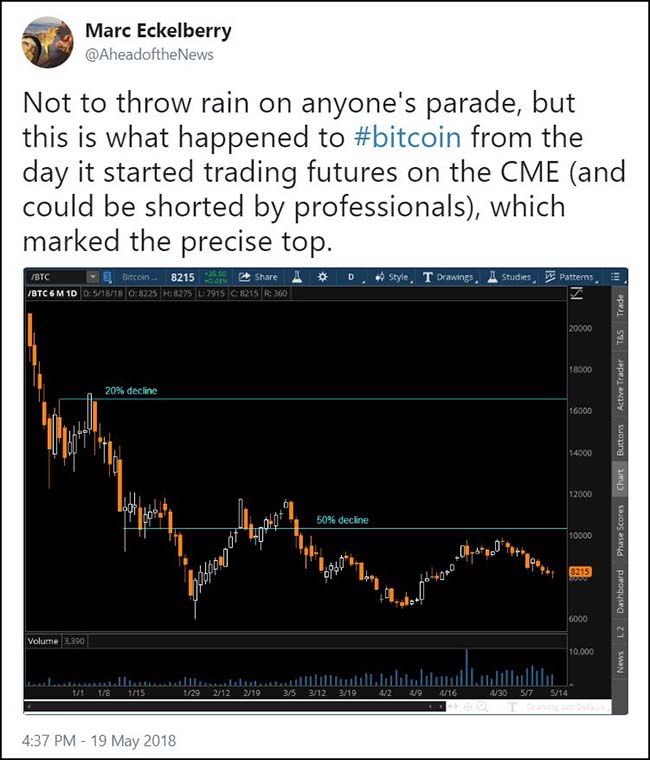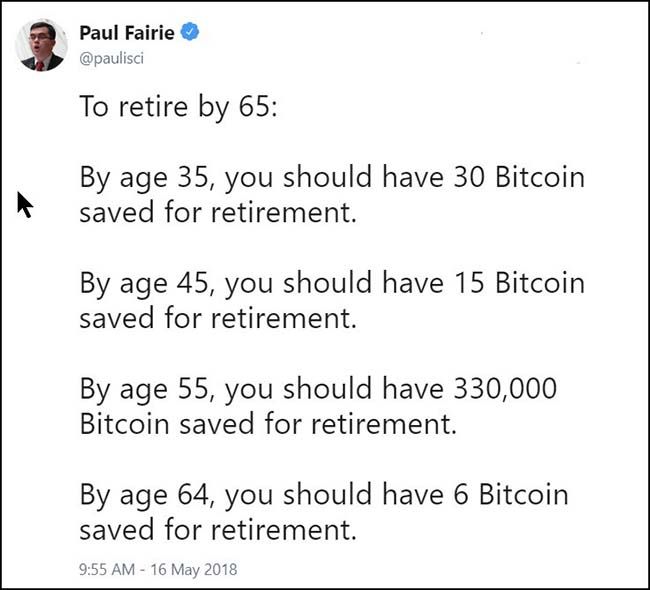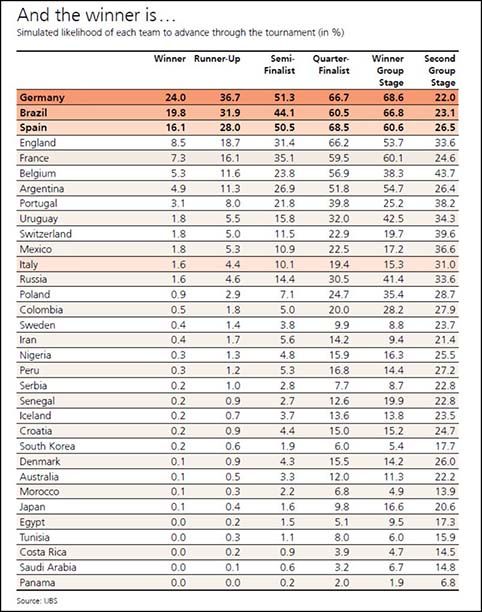Just end all this tariff nonsense and let’s get back to business. Farmers have soybeans futures to plant and Campbell(NYSE:CPB)’s urgently needs cheaper can prices. The steel workers will be upset, but from the looks of their stock prices they were about to lose volumes to imported finished goods anyway, as end customers shifted to cheaper solutions. We can only hope that the pause of this trade rift with China will lead to calmer heads in other trade negotiations (NAFTA and the EU).
While global trade wrinkles meet an iron this weekend, a few other articles need to find a steam press. First there is Venezuela which is unraveling further after the world turns against their sham Presidential election on Sunday. As planet Earth turns away from buying Venezuelan oil, prices will go higher. Global energy stores are exhausted and even a small supply disruption will elevate prices. But Venezuela is more than a small producer. U.S. and Iran angst only adds to oil price uncertainty. Hope that you locked in your summer airfare prices, or are soon taking delivery of your Tesla (NASDAQ:TSLA).
The continued rise in U.S. interest rates and the U.S. dollar is putting significant pressure on Emerging Market currencies. And forex pressure is causing investment outflows which of course is negatively impacting EM stocks and bonds. Capital outflows is the last thing that Argentina, Turkey and others need right now. Investors will need extra thick stomach lining to hang onto their EM investments this year if the U.S. dollar continues to strengthen.
While the markets will wrestle with higher oil prices and increasing troubles in Emerging Markets, I’d expect any return to normal on global trade to help U.S. stock prices for the time being. The direct beneficiaries of multi-national industrial and material companies, as well as anything touching grains, fruits and vegetables will see the most benefit. Those names that were hurt the most during the trade war will now see the most relief. This shift will throw a small wrench in the summer portfolio plans of several active funds. The environment also gets a bit better for credit which remains under the microscope for many of us. So, maybe it will end up being a good summer after all for investors…just like it will be for soccer fans because the World Cup begins in less than five weeks!
The good trade news update on Sunday (Bloomberg)…
The U.S. and China declared a truce in their trade dispute over the weekend, but that will prove temporary if the world’s two largest economies fail to deliver on their vague commitments to re-balance trade.
“We’re putting the trade war on hold,” Treasury Secretary Steven Mnuchin said Sunday after the two sides released a joint statement a day earlier. “Right now, we have agreed to put the tariffs on hold while we execute the framework.”
For now, Mnuchin’s cease-fire declaration will soothe the nerves of investors worried that the world’s two biggest economies were on the verge of an all-out trade conflict. US President Donald Trump had threatened to slap tariffs on up to $150 billion in Chinese imports, and Beijing vowed to respond in kind.
No company more excited to see the metal tariffs stop than Campbell Soup, which fell -12% after their earnings report last week…
Looking for maximum business uncertainty? Try being a grain farmer in 2018…
Tom Giessel is cutting back on plantings this year on his farm in central Kansas as he reckons with a drought, a glut in global grains supply and trade tensions between the United States and China.
About 200 miles away in the northwestern part of the state, farmer Janet Bear swapped the sorghum seed she ordered for corn, after top importer China slapped steep anti-dumping investigation into U.S. sorghum. The action pushed down U.S. prices and made the crop less profitable.
China dropped its probe on Friday, retreating from a dispute that had upended global grains markets.
Beijing separately threatened last month to slap an aggressive 25 percent tariff on U.S. soybeans, the single most valuable U.S. agricultural export to China, worth about $12 billon annually….
The conflict between the world’s two largest economies has sown uncertainty in the U.S. heartland about what crops will be profitable come harvest. Some farmers have changed from one crop to another. Others have decided to leave some land fallow rather than risk growing a money-losing crop.
Nationally, U.S. farmers are set to plant the fewest acres with crops in seven years, according to the most recent farmer survey from the U.S. Department of Agriculture. The agency’s forecast for 318 million crop acres is down just 0.4 percent from 2017, but it signals curbs in plantings of everything from corn and soybeans to sugar beets and sunflowers.
The trade dispute adds another layer of complexity to U.S. farmers’ decisions as they wonder whether one of the biggest buyers in global agricultural markets, China, will want to import U.S. produce and in what volumes.
A good review of which commodities could win as trade with China resumes…
Commodities were a big casualty of the escalating trade war between the U.S. and China, but are now set to be a major beneficiary of Beijing’s pledge to import more American goods.
One commodity winner according to the White House will be energy…
And as new IEA data shows, crude inventories are now below their five-year average.
The airlines are clearly betting that Stephanie will spend a minimum of $2,500 on in-flight magazine purchases…
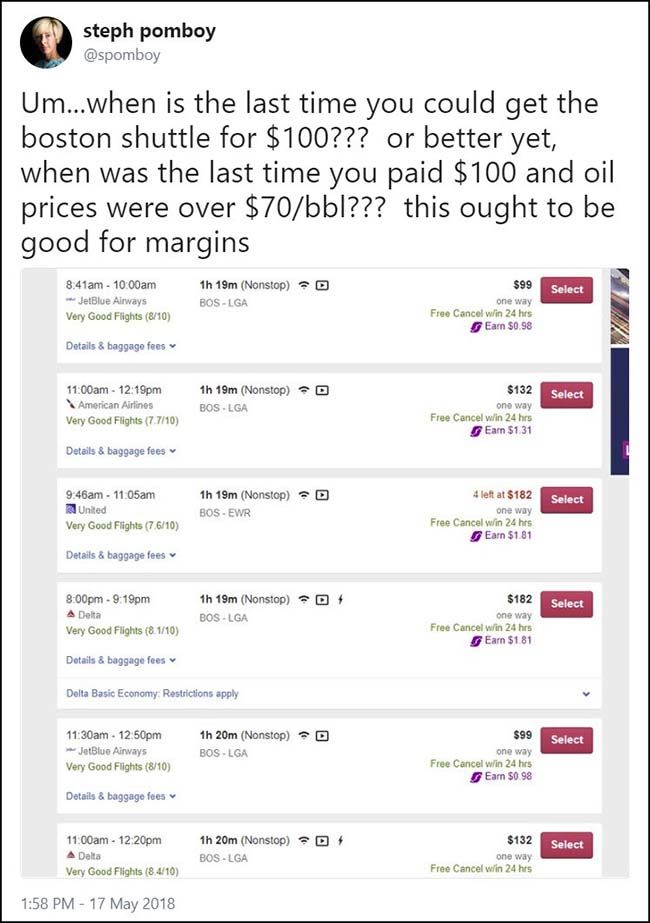
To receive this weekly briefing directly to your inbox, subscribe now.
Emerging Market currencies are getting smoked…
(WSJ/Daily Shot)
The strong U.S. dollar and interest rates have wrecked Emerging Market Bonds…
U.S. high yield credit has held in well. Will it continue?
Important Fed comment (Bloomberg)…
Fed’s Bostic says his “job” is to prevent curve inversion. “I have had extended conversations with my colleagues about a flattening yield curve and the risks of it inverting…we are aware of it. So it is my job to make sure that doesn’t happen”
As U.S. rates move higher, lots of talk about where the tipping point lies…
(@jsblokland)
Italians have decided on a populist government…
So there goes government spending and interest rates.
(WSJ/Daily Shot)
Italy is now the new fly in the EU’s ointment. And the Euro is not happy…
And European financial stocks need to be admitted to the hospital…
For the week, Small Cap stocks continued to lead the markets due to the surge in the U.S. dollar…
And emerging market equities did the opposite.
Among sectors, Energy stocks led while Bond proxies lagged…
Go get ’em Wall Street Journal (WSJ)…
Theranos was just a warm up to what they will find in the land of crypto.
Hundreds of technology firms raising money in the fevered market for cryptocurrencies are using deceptive or even fraudulent tactics to lure investors.
In a review of documents produced for 1,450 digital coin offerings, The Wall Street Journal has found 271 with red flags that include plagiarized investor documents, promises of guaranteed returns and missing or fake executive teams.
“Jeremy Boker” is listed as a co-founder of Denaro, an online-payment project. In investor documents for a public offering in March, which claimed to have raised $8.3 million, Mr. Boker boasted of his cryptocurrency startup’s “powerhouse” team. In his biography, he noted a “respectable history of happy clients” in consulting before he launched Denaro.
In fact, Mr. Boker’s bio image was a stock photo, there is no evidence he exists and the rest of his team appears to be fictional, except for two freelancers who said they were paid by people unknown to them to market the project, the Journal found.
You have seen how this story ends…
Thanks to barely there government oversight and a gold-rush mentality surrounding Bitcoin, people have flocked to start their own copycat coins which, they hope, will be the next big thing.
“It’s perplexing,” said David Tran, a VP of marketing at Coinberry, a trading app that hopes to continue bringing cryptro-currencies to the mainstream and to shed its image as mainly being used by drug dealers. “It feels like the 1990s internet.”
As a partygoer asked Tran about his company, another attendee sidled up and shouted, “Coinberry!” — wrapping his arm around Tran.
“I love Coinberry,” said the man who was suddenly Tran’s best friend. “I’m, like, a criminal, and I got verified [cleared to trade on Coinberry] right away.”
As the yacht — with its 30,000 square feet of party space — pulled out of Pier 81 on Manhattan’s West Side, scores of young women wrapped in form-fitting black party dresses paired off with boyfriends or just mingled among schlubby guys in T-shirts or Wall Street pros.
Dudes with neck tattoos got into the scene — as a guy wearing a space helmet floated around the dance floor.
Everyone thought that launching futures on Bitcoin was a good idea…
If you are still a long-term believer in Bitcoin, then this is how your investment might play out…
Kroger (NYSE:KR) decides to go out fighting rather than to get completely run over by Amazon (NASDAQ:AMZN) and Walmart (NYSE:WMT)…
U.K. online supermarket Ocado (LON:OCDO) announced a deal Thursday to share its technology exclusively with Kroger, which trails only Walmart in the $650 billion U.S. grocery market. Online grocery delivery is expensive and inefficient, and Ocado may be the world’s leader in automating the process, which could give Kroger a boost against its rivals. Ocado’s most modern warehouse in South East England uses robots to pick groceries from a giant hive of boxes—a high-tech, high-spec solution that is expensive to set up but promises huge savings versus human pickers once operated at scale.
Kroger is committing to roll out this technology across up to 20 warehouses over three years. In exchange Ocado will stop discussions with Kroger’s rivals. The two partners will hammer out the finer details over the coming year. The agreement is cemented by a shareholding: Ocado will issue roughly $250 million worth of new stock to Kroger, increasing its stake to 6% from 1%.
Seattle is such an interesting place…
Twenty cities are competing for Amazon’s second headquarters. Then there’s Seattle, Amazon’s current headquarters, which the city apparently wouldn’t mind driving away.
Seattle’s city council on Monday unanimously approved a $250 “tax” per full-time employee on businesses with more than $20 million in annual revenue. Progressive council members had originally proposed a $500 jobs tax that would have turned into a 0.7% payroll tax in 2021, but then Seattle’s businesses revolted.
Amazon suspended two building expansion projects. More than 100 large businesses including Expedia (NASDAQ:EXPE), Alaska Airlines and Redbox wrote a letter warning that the tax sends the message “to every business: if you are investing in growth, if you create too many jobs in Seattle, you will be punished,” which “will cause far greater damage to Seattle’s growth prospects than the direct impact on the businesses being taxed.”
Three hundred or so small businesses also warned that “continuing tax increases and regulations will only hurt the small business community and will vastly change our city.” Even trade unions begged the council “not to tax our jobs away.”
What a great sports story down in Atlanta…
As in much of the American South, the sports landscape in Atlanta is dominated by football, both professional and college. But for transplants like Riddle without a tie to an existing franchise or university, true sports love can be hard to find. The Braves’ long run of success in Major League Baseball in the 1990s and early 2000s is now a memory, and last year the team moved to the suburbs. The Hawks of the N.B.A. have rarely drawn well, and two N.H.L. hockey teams have come and gone.
Last year, Atlanta United eagerly stepped into that pro sports void, smashing attendance records, dominating M.L.S. merchandise sales and leading the league in scoring. Six months after it first kicked a ball, it became only the fourth team in league history to qualify for the playoffs in its inaugural season. This year, its upward trajectory has continued unabated: Attendance has continued to grow, to about 50,000 fans a game, and the team is again competing for the league’s best record.
A year after the team first took the field, Atlanta United flags now fly in front yards and from porches in many neighborhoods. Sports talk radio shows devoted to soccer have found an audience, and it is increasingly difficult to spend a day in downtown Atlanta without seeing someone in one of the team’s jerseys.
For a long time, “Atlanta was known for traffic, sprawl and the airport,” said Michael Tavani, 38, another transplant and entrepreneur who works downtown. “It wasn’t cool to be from Atlanta.”But in the last five years, he said, he has sensed a growing pride in the city, especially among its younger residents. “This generation of people,” Tavani said, “want to create a special place.”
With the World Cup less than five weeks away, UBS picks Germany…
If you think that you can do better, join the 361 Capital World Cup Challenge the winner will receive a team jersey. Pro tip: Don’t pick Italy.
With the start of the World Cup in Russia less than a month away, UBS deployed a team of 18 analysts and editors, and ran a computer simulation of the tournament 10,000 times, in an effort to predict the likely winner of the tournament.
It’s a familiar game for UBS and other banks, many of which run competing models to predict the quadrennial World Cup. While the simulations might sounds impressive, they’re not always accurate: In 2014 UBS said hosts Brazil would prevail, only to see the team humiliated in a 7-1 semifinal loss to Germany, the eventual winner.
The information presented here is for informational purposes only, and this document is not to be construed as an offer to sell, or the solicitation of an offer to buy, securities. Some investments are not suitable for all investors, and there can be no assurance that any investment strategy will be successful. The hyperlinks included in this message provide direct access to other Internet resources, including Web sites. While we believe this information to be from reliable sources, 361 Capital is not responsible for the accuracy or content of information contained in these sites. Although we make every effort to ensure these links are accurate, up to date and relevant, we cannot take responsibility for pages maintained by external providers. The views expressed by these external providers on their own Web pages or on external sites they link to are not necessarily those of 361 Capital.

